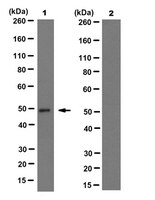Isocitrate dehydrogenase mutation is frequently observed in giant cell tumor of bone.
Kato Kaneko, M; Liu, X; Oki, H; Ogasawara, S; Nakamura, T; Saidoh, N; Tsujimoto, Y; Matsuyama, Y; Uruno, A; Sugawara, M; Tsuchiya, T; Yamakawa, M; Yamamoto, M; Takagi, M; Kato, Y
Cancer science
105
744-8
2014
Zobrazit abstrakt
Giant cell tumors of bone (GCTB) are benign and locally destructive tumors that include osteoclast-type multinuclear giant cells. No available treatment is definitively effective in curing GCTB, especially in surgically unresectable cases. Isocitrate dehydrogenase (IDH) mutations have been reported not only in gliomas and acute myeloid leukemias, but also in cartilaginous tumors and osteosarcomas. However, IDH mutations in GCTB have not been investigated. The IDH mutations are remarkably specific to arginine 132 (R132) in IDH1 and arginine 172 (R172) or arginine 140 (R140) in IDH2; IDH1/2 mutations are known to convert α-ketoglutarate to oncometabolite R(-)-2-hydroxyglutarate. We recently reported that the most frequent IDH mutation in osteosarcomas is IDH2-R172S, which was detected by MsMab-1, a multispecific anti-IDH1/2 mAb. Herein, we newly report the IDH mutations in GCTB, which were stained by MsMab-1 in immunohistochemistry. DNA direct sequencing and subcloning identified IDH mutations of GCTB as IDH2-R172S (16 of 20; 80%). This is the first report to describe IDH mutations in GCTB, and MsMab-1 can be anticipated for use in immunohistochemical determination of IDH1/2 mutation-bearing GCTB. | 24898068
 |
Establishment of a multi-specific monoclonal antibody MsMab-1 recognizing both IDH1 and IDH2 mutations.
Kato Kaneko, M; Ogasawara, S; Kato, Y
The Tohoku journal of experimental medicine
230
103-9
2013
Zobrazit abstrakt
Mutations of isocitrate dehydrogenase 1 (IDH1) and isocitrate dehydrogenase 2 (IDH2) have been reported in gliomas, cartilaginous tumors, and acute myeloid leukemias. IDH mutations are specific to a single codon in the conserved and functionally important arginine 132 residue (R132) of IDH1 or arginine 172 residue (R172) of IDH2 in gliomas. Although IDH1 and IDH2 catalyze the oxidative carboxylation of isocitrate to α-ketoglutarate in cytosol and mitochondria, respectively, mutated IDH1/2 proteins can possess the ability to change α-ketoglutarate to an oncometabolite R(-)-2-hydroxyglutarate. We have established several monoclonal antibodies (mAbs) specific for IDH1/2 mutations. However, no multi-specific mAb against IDH1/2 mutations has been reported. For this study, we immunized mice with an IDH1-R132G peptide of 19 amino acids (GGVKPIIIGGHAYGDQYRA), and established a novel mAb MsMab-1 that recognizes IDH1-R132G, but not wild type IDH1 in enzyme-linked immunosorbent assay (ELISA). It is particularly interesting that MsMab-1 recognizes all IDH1 mutants (R132H, R132C, R132S, R132G, R132L) in ELISA. Western blot analysis also revealed that MsMab-1 reacted with recombinant proteins of IDH1-R132H, IDH1-R132S, and IDH1-R132G, but not with wild type IDH1 and other IDH1 mutations, indicating that MsMab-1 is a multi-specific anti-mutated IDH1 mAb. Unexpectedly, MsMab-1 recognizes IDH2-R172M protein, despite that the IDH1-R132G peptide shows only 73.7% identity with the equivalent portion of IDH2-R172M (GGTKPITIGMHAHGDQYKA). Moreover, MsMab-1 stained the IDH1-R132S or IDH1-R132G-expressing glioma cells in immunohistochemistry. This report is the first to establish a multi-specific anti-mutated IDH1/2 mAb, that is expected to be useful for immunohistochemical determination of IDH1/2 mutation-bearing tumors. | 23782684
 |
Isocitrate dehydrogenase 2 mutation is a frequent event in osteosarcoma detected by a multi-specific monoclonal antibody MsMab-1.
Liu, X; Kato, Y; Kaneko, MK; Sugawara, M; Ogasawara, S; Tsujimoto, Y; Naganuma, Y; Yamakawa, M; Tsuchiya, T; Takagi, M
Cancer medicine
2
803-14
2013
Zobrazit abstrakt
Somatic mutations of isocitrate dehydrogenase (IDH) 1 and IDH2 occur in gliomas, acute myeloid leukemia, and cartilaginous tumors. Somatic mosaic IDH1/2 mutations are also reported in Ollier disease and Maffucci syndrome, which are characterized by multiple central cartilaginous tumors. Although IDH1/2 mutation analysis against osteosarcoma has been performed in several studies, no IDH1/2 mutation has been reported. Herein, we newly report the IDH2-R172S mutation in three of 12 (25%) osteosarcoma patients, which was detected by direct DNA sequencing. No monoclonal antibody (mAb) has been reported against IDH2-R172S mutation. However, we demonstrate that the IDH2-R172S peptide was recognized by our established multi-specific anti-mutated IDH1/2 mAb, MsMab-1, in enzyme-linked immunosorbent assay. Western blot analysis revealed that MsMab-1 reacts with PA tag combined recombinant proteins of IDH2-R172S. Furthermore, MsMab-1 stained IDH2-R172S-expressing osteosarcoma tissues in immunohistochemistry. The MsMab-1 stained nine of 32 (28.1%) osteosarcomas in a tissue microarray. This report is the first describing IDH2 mutations in osteosarcoma, which can be detected by MsMab-1 mAb. Taken together, these results show that MsMab-1 can be anticipated for use in immunohistochemical determination of IDH1/2 mutation-bearing osteosarcoma. | 24403254
 |











